- Home
- Naguib Mahfouz
The Beginning and the End
The Beginning and the End Read online
FIRST ANCHOR BOOKS EDITION, 1989
Copyright © 1985 by The American University in Cairo Press
All rights reserved under International and Pan-American Copyright Conventions. Published in the United States by Anchor Books, a division of Random House, Inc., New York, and simultaneously in Canada by Random House of Canada Limited, Toronto. This English translation first published by The American University in Cairo Press in 1985. First published in Arabic as Bidayah wa-Nihayah in 1949. The Anchor Books edition is published by arrangement with The American University in Cairo Press.
Anchor Books and colophon are registered trademarks of Random House, Inc.
All of the characters in this book are fictitious, and any resemblance to actual persons, living or dead, is purely coincidental.
Library of Congress Cataloging-in-Publication Data
Maḥfūẓ, Najīb, 1911 –
[Bidāyah wa-nihāyah. English]
The beginning and the end
Naguib Mahfouz; translated by Ramses Awad; edited by Mason Rossiter Smith.
1st Doubleday ed.
p. cm.
Translation of: Bidāyah wa-nihāyah.
1. Smith, Mason Rossiter, 1909– . I. Title.
[PJ7846.A46B513 1989] 89-33116
892′.736—dc20
ISBN 9780385264587
eBook ISBN 9780525431640
www.anchorbooks.com
v4.1
a
Contents
Cover
Title Page
Copyright
Introduction
Chapter One
Chapter Two
Chapter Three
Chapter Four
Chapter Five
Chapter Six
Chapter Seven
Chapter Eight
Chapter Nine
Chapter Ten
Chapter Eleven
Chapter Twelve
Chapter Thirteen
Chapter Fourteen
Chapter Fifteen
Chapter Sixteen
Chapter Seventeen
Chapter Eighteen
Chapter Nineteen
Chapter Twenty
Chapter Twenty-one
Chapter Twenty-two
Chapter Twenty-three
Chapter Twenty-four
Chapter Twenty-five
Chapter Twenty-six
Chapter Twenty-seven
Chapter Twenty-eight
Chapter Twenty-nine
Chapter Thirty
Chapter Thirty-one
Chapter Thirty-two
Chapter Thirty-three
Chapter Thirty-four
Chapter Thirty-five
Chapter Thirty-six
Chapter Thirty-seven
Chapter Thirty-eight
Chapter Thirty-nine
Chapter Forty
Chapter Forty-one
Chapter Forty-two
Chapter Forty-three
Chapter Forty-four
Chapter Forty-five
Chapter Forty-six
Chapter Forty-seven
Chapter Forty-eight
Chapter Forty-nine
Chapter Fifty
Chapter Fifty-one
Chapter Fifty-two
Chapter Fifty-three
Chapter Fifty-four
Chapter Fifty-five
Chapter Fifty-six
Chapter Fifty-seven
Chapter Fifty-eight
Chapter Fifty-nine
Chapter Sixty
Chapter Sixty-one
Chapter Sixty-two
Chapter Sixty-three
Chapter Sixty-four
Chapter Sixty-five
Chapter Sixty-six
Chapter Sixty-seven
Chapter Sixty-eight
Chapter Sixty-nine
Chapter Seventy
Chapter Seventy-one
Chapter Seventy-two
Chapter Seventy-three
Chapter Seventy-four
Chapter Seventy-five
Chapter Seventy-six
Chapter Seventy-seven
Chapter Seventy-eight
Chapter Seventy-nine
Chapter Eighty
Chapter Eighty-one
Chapter Eighty-two
Chapter Eighty-three
Chapter Eighty-four
Chapter Eighty-five
Chapter Eighty-six
Chapter Eighty-seven
Chapter Eighty-eight
Chapter Eighty-nine
Chapter Ninety
Chapter Ninety-one
Chapter Ninety-two
About the Author
Books by Naguib Mahfouz
INTRODUCTION
Naguib Mahfouz was born in 1911 in Gamaliyya, an old quarter of Cairo, which was the setting for several of his novels, to a family which earned its living from trade. When he was six years old his family moved to Abbasiyya, then at the outskirts of the capital.
Mahfouz’s writings clearly reflect the deep concern of the Egyptian petite bourgeoisie with material security, its worry about the morrow, its conformity to the system, and its disinclination to challenge the authorities or the powers that be. The sole preoccupation of this class was, and perhaps still is, security.
In 1930 Mahfouz entered the Secular University in Cairo, where he studied philosophy. It was his desire to give up this field to study the Arabic language, with which he was infatuated, but since this proved to be impossible, he accepted his academic lot and obtained a B.A. in philosophy in 1934. Then he registered for the master’s program in philosophy, the proposed title of his thesis being “The Concept of Beauty in Islamic Philosophy.”
Almost all of his readings as a graduate student were in philosophy. His readings in literature were meager. This early concern with philosophy led him to contribute a number of essays to the field, such as “The Evolution of Social Phenomena,” “What Is Philosophy?,” “Bergson’s Philosophy,” “Perception and the Senses,” “The Decline of Some Beliefs and the Emergence of Others,” “Pragmatism,” and “Old and New Trends in Psychology.” Slim as his readings in literature at that time were, the choice of aesthetics as the topic for his unfinished thesis (perhaps never embarked on) is evidence of his long-standing love for the arts.
With his awakening to literature in the late thirties, Mahfouz turned to Arab as well as Western literary masterpieces. He was greatly influenced by the works of Taha Hussein, Abbas al-Akkad, and Salama Mousa, and openly acknowledges this influence. Mahfouz says that he learned the meaning of intellectual revolt from Taha Hussein, and acquired a belief in the value of the arts, democracy, and individual liberty from Akkad. In Akkad’s Sarah, he also found an Arabic prototype of the psychological novel. From Salama Mousa, Mahfouz gained an awareness of the value of science, socialism, and intellectual tolerance, and the opportunity to publish many of his articles in The New Magazine.
When Mahfouz appeared on the literary scene, the Arabic novel was still a new genre, received from his predecessors in a crude form that only vaguely foretold the changes it would undergo as Mahfouz and his contemporaries transformed it into a highly developed art form. In order to develop their talents, however, he and the other novelists of his generation felt they needed to become acquainted with the fictional heritage and techniques of the West.
Mahfouz read widely in the literature of the West, reading world literature either in English or in Arabic translations. On the whole, he found it much easier to read the moderns—the difficulties of the foreign languages of earlier periods stood between him and the classics. He is conscious of this limitation and the resulting gap in his readings: as he ruefully points out, instead of going directly to
the masters, he has learned at the hands of their disciples. He regrets that he has never read Dickens or Balzac, both precursors of the realistic novel for which Mahfouz himself is noted; instead, he discovered realism in the works of such authors as Huxley, Lawrence, Galsworthy, and Flaubert.
His favorites in Russian literature were Tolstoy, Dostoyevsky, Turgenev, and Chekhov; in German literature, Thomas Mann, Goethe, and Kafka. Of French literature he read Anatole France, Flaubert, Proust, Malraux, Mauriac, Sartre, and Camus; of English, Shakespeare, Wells, Shaw, Joyce, Huxley, and Lawrence; of American, Hemingway, Faulkner, Dos Passos, O’Neill, Tennessee Williams, and Arthur Miller. Much as he has gained from the work of these authors, none of them has visibly affected his own fiction, which remains unmistakably Egyptian, a clear testimony to his uniqueness and originality.
When Mahfouz started his novelistic career Egypt was undergoing a period of political unrest, suppression, and despotism. In June 1930 the notorious despot Ismail Sidki became Prime Minister. He suspended the 1923 constitution under the pretext that Egypt was not yet ready for a Western-style democracy. Silencing all opposition, he brutally crushed any attempt at questioning his authority. A ferocious and merciless attack was launched against Taha Hussein for daring to voice and publish some skeptical views about pre-Islamic poetry, and he was accused of being a heretic and a disciple of the devil. The tumult ended with his expulsion as dean of the Faculty of Arts. Akkad’s fate was no better: he landed in prison on the charge that he had abused the royal family.
In this repressive atmosphere, Mahfouz acquired a serpentine wisdom which he has never lost. Realizing, like his predecessor Tawfik al-Hakim, the futility of open rebellion against the autocracy of the ruler, he managed to devise a narrative method that would imply criticism of the system without jeopardizing his interests or running the risk of antagonizing the authorities. As the painful lessons of the early thirties sank into his mind, the wary Mahfouz veiled in his historical fiction his criticism of contemporary Egypt, whose plight he blamed on three sources: despotic monarchy, imperialism, and the servants of imperialism. In three historical novels set in ancient Egypt, The Mockery of Fate (1939), Radobais (1943), and The Struggle of Thebes (1944), he mixed history with symbols, projecting his political sentiments into the events of pharaonic history.
In the later forties and fifties, Mahfouz began employing a more realistic style, with modern Egypt as his setting. Between 1956 and 1957, he produced his famous trilogy, consisting of Bayn al-Qasrayn, Qasr al-Shawq, and al-Sukkariyya, in which he depicted the vicissitudes of fate which swept up three generations of a Cairene family from the 1920s up to the Second World War. To this phase also belong The Beginning and the End (written in 1942–43 and published in 1949), The New Cairo (1945), Khan el-Khalili (1946), and Midaq Alley (1947). The Beginning and the End is a masterpiece of human compassion. So striking is its humanitarianism and sensitivity to human suffering that its tragic vision of life transcends the Egyptian locale and assumes universal significance. It reflects with sympathy and well-balanced pathos the material, moral, and spiritual problems of an Egyptian petit bourgeois family confronted with poverty during the Second World War.
A versatile and prolific writer, Mahfouz published a number of other novels, including Awlad Haritna (1959, published in English as The Children of Gebelawi), an allegorical novel with metaphysical implications that deals with man’s quest and thirst for religious faith. In the 1960s, Mahfouz returned to his fictional preserve, the social novel, experimenting now with more impressionistic, psychological styles. In 1961 he published The Thief and the Dogs, this time mixing social and political realism with the stream-of-consciousness technique, new to the Arabic novel. Again, the quest for the mystical and spiritual is to be found in his novels The Beggar (1965) and Chitchat on the Nile (1966).
The importance of Mahfouz’s work as social and political commentary is well described by M. M. Badawi in an article written for The Egyptian Bulletin in June 1982:
The destinies of the individual characters are the microcosm, but the macrocosm is the destiny of modern Egypt. The tragedies, the poignant sufferings, the conflicts of the numerous men and women who people these novels reflect the larger social, intellectual, and political changes in one significant part of the modern Arab world. The struggle of the younger generation of men and women to attain their domestic freedom to shape their own lives mirrors or parallels the nation’s struggle to achieve political independence and to free itself from the shackles of outworn and debilitating, almost medieval, conventions and world outlook in a gigantic endeavor to belong to the modern world.
On the whole, this is a valid description of Mahfouz’s fictional world. But it is not this which inflamed my imagination and so much stirred my feelings that I was eager to translate The Beginning and the End. More often than not, critics focus their attention on the social, political, and documentary aspects of Mahfouz’s work, reducing him to a mere producer of sociopolitical commentary. They very regrettably ignore his powerfully tragic vision of life. There is something Shakespearean about the unfortunate lot of the miserable family which unfolds in The Beginning and the End, just as there is something Shakespearean about the tragic fate of the family in Thomas Hardy’s Tess of the D’Urbervilles. Nevertheless, a gleam of the hope for regeneration penetrates the almost overwhelming gloom of both novels.
RAMSES AWAD
ONE
The master in charge of school discipline cast a gloomy look down the long corridor which overlooked the upper school classes. The Tawfikiyah School was enveloped in deep silence. He went to one of the junior classes, knocked apologetically, and approached the teacher, whispering a few words to him. The teacher looked intently at a pupil in the second row and called out, “Hassanein Kamel Ali.”
At the sound of his name, the pupil arose, casting his eyes in suspense and anxiety from his teacher to the school proctor. “Yes, sir,” he murmured.
“Go with the proctor,” said the teacher.
The boy left his desk and followed the proctor, who walked slowly out of the classroom. Uneasy about the reason for this summons, Hassanein kept asking himself: Could it be those recent demonstrations? He had taken part in them, shouting together with the others, “Down with Hor. Down with Hor, son of a bull!” He thought he had escaped the bullets, the canes, and school punishments altogether. Had he been optimistic? Thoughtfully, he followed the proctor along the long corridor, expecting him to turn around at any moment and confront him with whatever charges he had against him. This train of thought was interrupted when the man halted in front of one of the senior classes and excused himself before entering. He heard the teacher calling out, “Hussein Kamel Ali.” He wondered: My brother, too! But how can he be charged with anything of the sort when he never participated in any demonstrations? The proctor returned, followed by the dumbfounded boy. As soon as he saw his brother, Hassanein murmured in astonishment, “You, too! What’s wrong?”
They exchanged puzzled glances, then followed the proctor as he strode off in the direction of the headmaster’s office. “Why,” Hussein asked him gently and politely, “have we been called out of class?”
“You’re to see the headmaster,” the proctor answered hesitantly.
Silently, they continued along the remaining part of the corridor. The two brothers looked very much alike. Both had long faces, large hazel eyes, and deep, dark complexions. Yet the nineteen-year-old Hussein, the elder by two years, was shorter than his brother. Hassanein had fine features, which made him look more radiantly handsome than his brother. Nearing the headmaster’s office, they became more alarmed. In awe and apprehension, they saw his stern countenance in their mind’s eyes. The proctor buttoned his jacket, knocked on the door, gently opened it, and entered, nodding to the boys to follow. They went in, staring at the man, who was bent over his desk facing the door. He was carefully reading a letter; as if he were unaware of their presence, he did not raise his eyes to the newcomers. The proctor
greeted the headmaster with extreme courtesy.
“Here are the two pupils, Hussein and Hassanein Kamel Ali,” he said.
Folding the letter in his hands, the headmaster lifted his head. He extinguished a cigarette butt in an ashtray, and glanced steadily from one brother to the other.
“Which class are you in?” he asked.
“Four D,” answered Hussein, his voice trembling.
“Three C,” said Hassanein.
“I hope you can take what I have to tell you as brave young men should,” he said, looking at them intently. “Your elder brother has informed me that your father is dead. My condolences.”
They were stunned and deeply perturbed. Hassanein was unable to comprehend the news.
“Dead!” he exclaimed. “My father dead! Impossible!”
“But how?” Hussein murmured as if to himself. “Only two hours ago we left him in good health, getting ready to go to the Ministry.”
For a moment, the headmaster was silent. “What does your elder brother do for a living?” he asked them gently. “Nothing,” Hussein absently replied. “Don’t you have another brother?” the man continued. “A public servant, perhaps, or something of that sort?” Hussein shook his head. “No,” he answered.
“I hope you can bear up under the shock like men,” said the headmaster. “Now, go home. May God help you.”
TWO
They left the school and walked along Shubra Street, groping their way through their tears. Hassanein was the first to weep. Nervous, Hussein wanted to scold him, but his own tears gushed forth, his voice was choked with sobs, and he kept silent. They crossed to the other side of the street and quickened their pace toward the blind alley, Nasr Allah, a few minutes’ walk from the school.
“How did he die?” Hassanein asked his brother as if he were looking to him for help. Stunned, Hussein shook his head. “I don’t know,” he murmured. “I can’t imagine how it could have happened. He had his breakfast with us and we left him in good health. I don’t know how it happened…”
Hassanein tried to recall the details of this morning’s events. The first time he saw his father, he remembered, was when he came out of the bathroom. As usual, he said good morning to his father. Smiling, his father replied, “Good morning. Isn’t your brother up yet?” Then they gathered around the breakfast table. His father asked their mother to share their meal; saying that she didn’t feel like eating, she excused herself. “Join us and you’ll have an appetite,” the man said, but she insisted. Shelling an egg, he said indifferently, “Do as you like.” Hassanein couldn’t recall having heard him again, except for a brief cough. His last sight of his father was the man’s back as he went into his bedroom, wiping his hands with his towel. Now he was gone! Dead! What a horrible word. Secretly casting a fearful glance, Hassanein saw his brother’s sad, grief-stricken face, set hard as though he had suddenly grown old. Memories returned to him in painful anguish. I don’t believe he’s dead. I can’t believe it! What is death? No, I can’t believe it! Gone! Had I known that this would be his last day on earth, I would never have left the house. But how could I have known? Does a man die while he’s eating and laughing? I don’t believe it. I can’t believe it. Hassanein was recalled from his thoughts as his brother pulled him by the arm toward Nasr Allah, which in his distraction he had almost passed by. They walked along the narrow alley, lined on both sides with old houses and small shops and cluttered with paraffin oil and vegetable and fruit carts. Their eyes sought their three-storied house with its huge dusty yard. Then they heard the wailings and screams. Distinguishing the voices of their mother and elder sister, they were so deeply moved that they burst out crying. They ran on heedlessly, climbing the stairs two at a time until they reached the second floor. They found the door of their flat open and rushed in, crossed the hall to their father’s bedroom at the far end, and entered it, panting. Their eyes fixed on the bed, the form of a dead body apparent under the coverlet. They approached the edge of the bed and, weeping hysterically, flung themselves upon it. Their mother and sister ceased their wailing and two strange women in the room departed. Their mother, dressed in black, her eyes red with weeping, her nose and cheeks swollen, composed herself to help her sons in their pent-up grief. Their sister threw herself on the sofa, hiding her face in its back. Her body was shaking with sobs. Hussein was weeping, mechanically reciting short verses from the Koran asking for God’s mercy to fall on his dead father. Fear-stricken, distracted, and incredulous, Hassanein was crying, too. He stood in the presence of death, protesting and rebellious, yet helpless and frightened. This cannot be my father. My father would never have heard all this crying without stirring. Oh, my God, why is he so still? They are wailing, as resigned, helpless people do. I had never conceived of this; and I still don’t. Didn’t I see him only two hours ago walking in this very room? No, this is not my father, this is not life. Waiting seemed endless. Then, Samira, the mother of the two young men, moved toward them. “That’s enough. Hussein,” she said, leaning forward. “Get up and take your brother outside.”

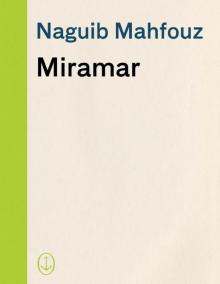 Miramar
Miramar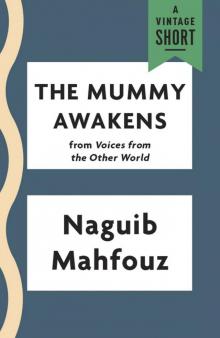 The Mummy Awakens
The Mummy Awakens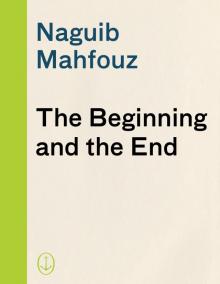 The Beginning and the End
The Beginning and the End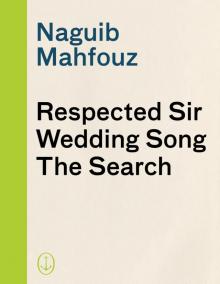 Respected Sir, Wedding Song, the Search
Respected Sir, Wedding Song, the Search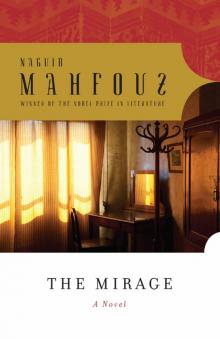 The Mirage
The Mirage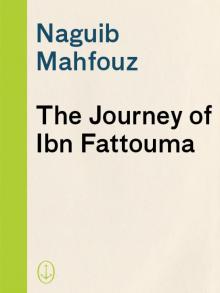 Novels by Naguib Mahfouz
Novels by Naguib Mahfouz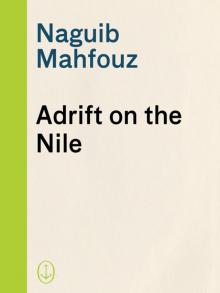 Adrift on the Nile
Adrift on the Nile Karnak Café
Karnak Café Heart of the Night
Heart of the Night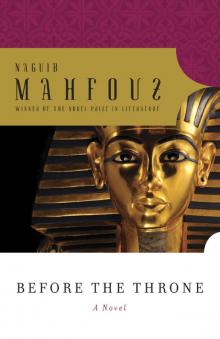 Before the Throne
Before the Throne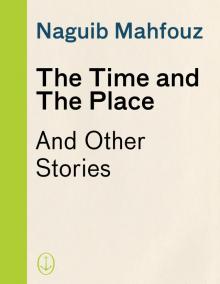 The Time and the Place: And Other Stories
The Time and the Place: And Other Stories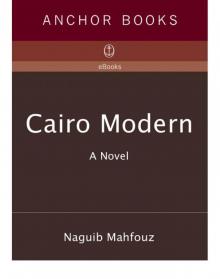 Cairo Modern
Cairo Modern Arabian Nights and Days
Arabian Nights and Days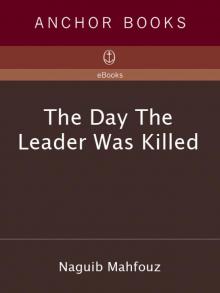 The Day the Leader Was Killed
The Day the Leader Was Killed Morning and Evening Talk
Morning and Evening Talk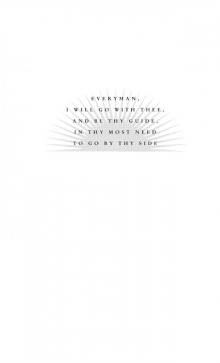 Three Novels of Ancient Egypt Khufu's Wisdom
Three Novels of Ancient Egypt Khufu's Wisdom Akhenaten: Dweller in Truth
Akhenaten: Dweller in Truth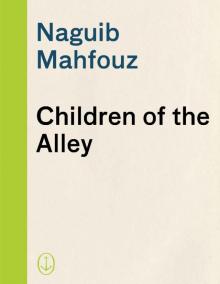 Children of the Alley
Children of the Alley Voices From the Other World
Voices From the Other World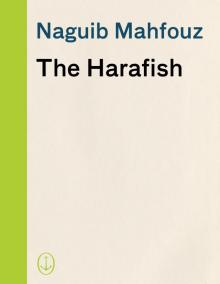 The Harafish
The Harafish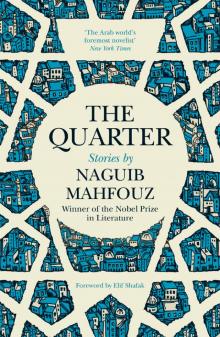 The Quarter
The Quarter The Seventh Heaven: Supernatural Tales
The Seventh Heaven: Supernatural Tales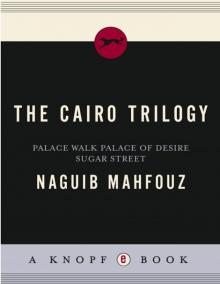 The Cairo Trilogy: Palace Walk, Palace of Desire, Sugar Street
The Cairo Trilogy: Palace Walk, Palace of Desire, Sugar Street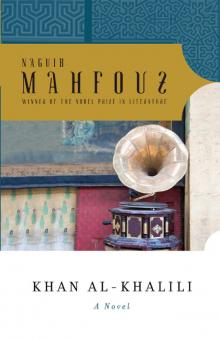 Khan Al-Khalili
Khan Al-Khalili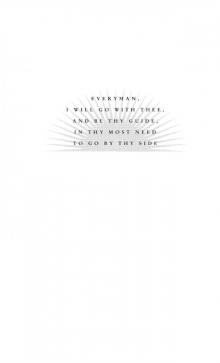 Three Novels of Ancient Egypt Khufu's Wisdom, Rhadopis of Nubia, Thebes at War
Three Novels of Ancient Egypt Khufu's Wisdom, Rhadopis of Nubia, Thebes at War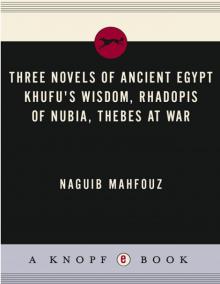 Three Novels of Ancient Egypt
Three Novels of Ancient Egypt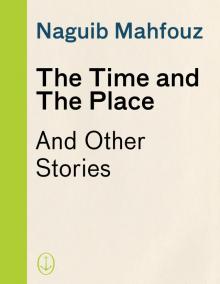 The Time and the Place
The Time and the Place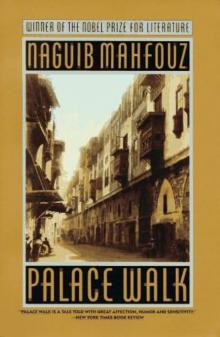 Palace Walk tct-1
Palace Walk tct-1 Akhenaten
Akhenaten The Seventh Heaven
The Seventh Heaven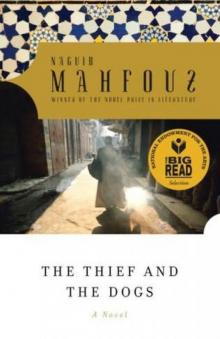 The Thief and the Dogs
The Thief and the Dogs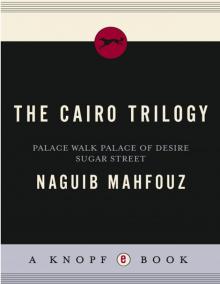 The Cairo Trilogy
The Cairo Trilogy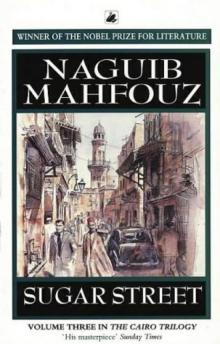 Sugar Street tct-3
Sugar Street tct-3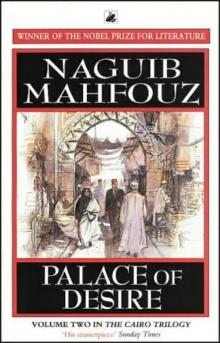 Palace of Desire tct-2
Palace of Desire tct-2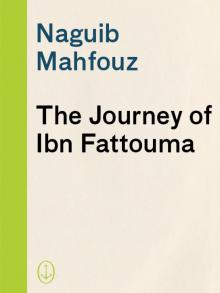 The Journey of Ibn Fattouma
The Journey of Ibn Fattouma